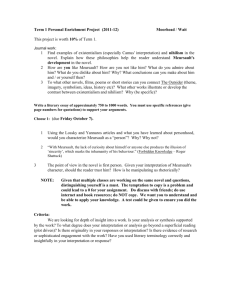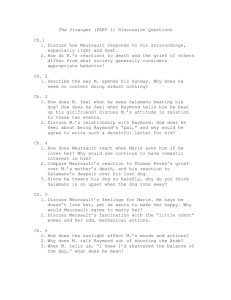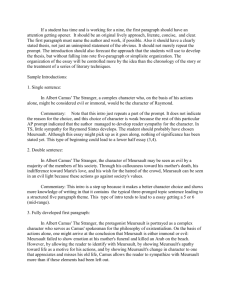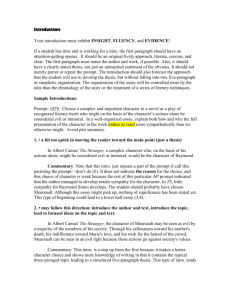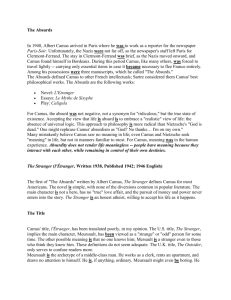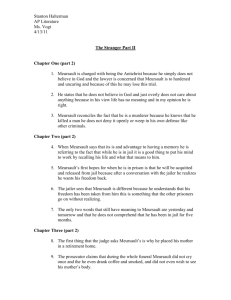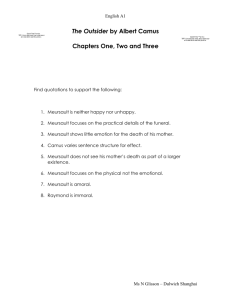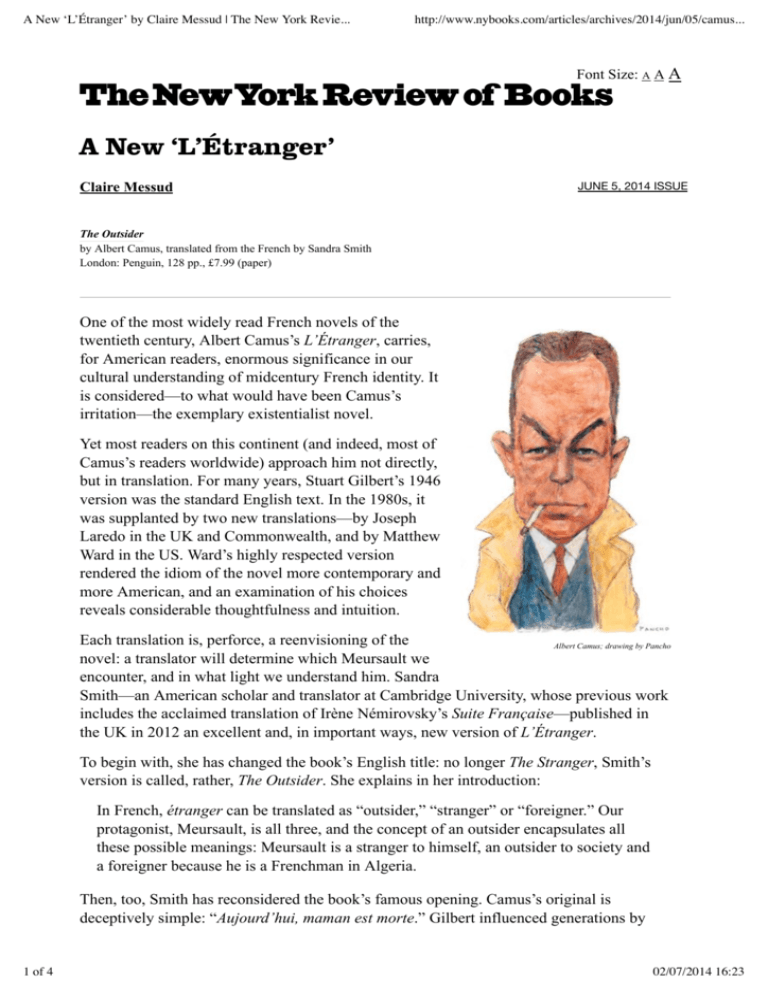
A New ‘L’Étranger’ by Claire Messud | The New York Revie...
http://www.nybooks.com/articles/archives/2014/jun/05/camus...
Font Size: A A A
A New ‘L’Étranger’
Claire Messud
JUNE 5, 2014 ISSUE
The Outsider
by Albert Camus, translated from the French by Sandra Smith
London: Penguin, 128 pp., £7.99 (paper)
One of the most widely read French novels of the
twentieth century, Albert Camus’s L’Étranger, carries,
for American readers, enormous significance in our
cultural understanding of midcentury French identity. It
is considered—to what would have been Camus’s
irritation—the exemplary existentialist novel.
Yet most readers on this continent (and indeed, most of
Camus’s readers worldwide) approach him not directly,
but in translation. For many years, Stuart Gilbert’s 1946
version was the standard English text. In the 1980s, it
was supplanted by two new translations—by Joseph
Laredo in the UK and Commonwealth, and by Matthew
Ward in the US. Ward’s highly respected version
rendered the idiom of the novel more contemporary and
more American, and an examination of his choices
reveals considerable thoughtfulness and intuition.
Each translation is, perforce, a reenvisioning of the
Albert Camus; drawing by Pancho
novel: a translator will determine which Meursault we
encounter, and in what light we understand him. Sandra
Smith—an American scholar and translator at Cambridge University, whose previous work
includes the acclaimed translation of Irène Némirovsky’s Suite Française—published in
the UK in 2012 an excellent and, in important ways, new version of L’Étranger.
To begin with, she has changed the book’s English title: no longer The Stranger, Smith’s
version is called, rather, The Outsider. She explains in her introduction:
In French, étranger can be translated as “outsider,” “stranger” or “foreigner.” Our
protagonist, Meursault, is all three, and the concept of an outsider encapsulates all
these possible meanings: Meursault is a stranger to himself, an outsider to society and
a foreigner because he is a Frenchman in Algeria.
Then, too, Smith has reconsidered the book’s famous opening. Camus’s original is
deceptively simple: “Aujourd’hui, maman est morte.” Gilbert influenced generations by
1 of 4
02/07/2014 16:23
A New ‘L’Étranger’ by Claire Messud | The New York Revie...
http://www.nybooks.com/articles/archives/2014/jun/05/camus...
offering us “Mother died today”—inscribing in Meursault from the outset a formality that
could be construed as heartlessness. But maman, after all, is intimate and affectionate, a
child’s name for his mother. Matthew Ward concluded that it was essentially untranslatable
(“mom” or “mummy” being not quite apt), and left it in the original French: “Maman died
today.” There is a clear logic in this choice; but as Smith has explained, in an interview in
The Guardian, maman “didn’t really tell the reader anything about the connotation.” She,
instead, has translated the sentence as “My mother died today.”
I chose “My mother” because I thought about how someone would tell another person
that his mother had died. Meursault is speaking to the reader directly. “My mother
died today” seemed to me the way it would work, and also implied the closeness of
“maman” you get in the French.
Elsewhere in the book, she has translated maman as “mama”—again, striving to come as
close as possible to an actual, colloquial word that will carry the same connotations as
maman does in French.
Smith has made a similarly considered choice when confronted, later in the novel, with
the ever-ticklish French contrast between vous and tu. Central to the novel’s plot is
Meursault’s burgeoning friendship with his unsavory neighbor, Raymond Sintès, a
friendship that develops as a result of Sintès’s interest rather than Meursault’s. In the
course of a long conversation, Meursault recalls:
Je ne me suis pas aperçu d’abord qu’il me tutoyait. C’est seulement quand il m’a
declaré, “Maintenant, tu es un vrai copain,” que cela m’a frappé…. Cela m’était égal
d’être son copain et il avait vraiment l’air d’en avoir envie.
Ward’s translation is as follows:
I didn’t notice at first, but he had stopped calling me “monsieur.” It was only when he
announced “Now you’re a pal, Meursault” and said it again that it struck me…. I
didn’t mind being his pal, and he seemed set on it.
This is a rather curious choice: to replace the tu/vous distinction with, in English, a
reference to the address monsieur—which appears in French in the English. It suggests that
an Anglophone reader will understand that, while saying “Mister” or “Sir” in English isn’t
quite comparable to the formalities of the French, we can infer, from the supposedly
retained (but actually inserted) French, the nature of Sintès’s forwardness. In other words,
Ward is presuming upon an English reader’s cultural fantasy of Frenchness.
Smith’s translation is much more straightforward:
At first I didn’t realize he’d started addressing me in a very personal way. It only
struck me when he said: “Now, we’re really pals.” …It didn’t matter to me one way or
the other whether we were friends or not, but it really seemed to matter to him.
When I read this, I understood at once that Smith was referring to the tu/vous
difference—as would any reader with even a minimal knowledge of French—but even
without that knowledge, the passage makes perfect sense.
2 of 4
02/07/2014 16:23
A New ‘L’Étranger’ by Claire Messud | The New York Revie...
http://www.nybooks.com/articles/archives/2014/jun/05/camus...
Again, with the last sentence of this quotation, Smith’s translation differs tellingly from
Ward’s. I myself would have been tempted to translate it in yet a different way: “It was all
the same to me to be his friend, and he really seemed to want it.” Smith’s translation is
unquestionably more elegant than mine; but it also comes closer to the French than Ward’s
does. This amounts to a matter of characterization, both of Meursault and of Sintès: in
Camus’s formulation, we understand that Meursault’s attitude is chiefly complaisant. Sintès
has a strong desire for friendship; Meursault, far from being cold, senses that strong desire
and, having no contrary desire of his own, is willing to go along.
Ward’s translation implies something more like obdurate determination on Sintès’s
part—“he seemed set on it”; whereas the French envie, meaning “desire,” suggests an
almost importunate element. It certainly implies something close to compassion on
Meursault’s part. Smith’s translation, while somewhat more oblique than “he really seemed
to want it,” nevertheless crucially conveys the extent of Meursault’s accommodating
nature: having truly no opinion, he will not pretend to one; and may as well, at that point,
accede to Sintès.
Smith is throughout attuned to such subtleties. She has a precise literary understanding of
Camus’s creations, and her Meursault emerges, in the crisp clarity of her prose,
emphatically not as a monster, but as a man who will not embellish or elaborate. His
insufficient demonstration of emotion at his mother’s funeral and the fact that he does not
believe in God will count for much in his condemnation to death by the court; but we are
not to understand thereby that Meursault is unfeeling or heartless. He is, rather, painfully
without pretense.
Consider the moment when Marie, Meursault’s girlfriend, asks him if he loves her: “I told
her that didn’t mean anything, but I didn’t think so.” This unsettling frankness is not
willfully hurtful; it is simply the truth. “She looked sad then. But while we were making
lunch, she laughed again, for no apparent reason, and the way she laughed made me kiss
her.”
The emotions of this exchange are repeated a thousand times a day in domestic
relationships, but they are not usually this openly expressed. The telling difference, in
Meursault, is that he eschews pretense, and proves almost idiotic—or perversely noble—in
his transparency. Smith’s translation portrays him thus, granting him kinship with the likes
of Prince Myshkin—albeit as the black sheep of the family.
Camus famously said that “Meursault is the only Christ that we deserve”—a complicated
statement for an avowed atheist. But Camus, of course, was more complex in his atheism
than we might commonly expect: he was an atheist in reaction to, and in the shadow of, a
Catholicism osmotically imbued in the culture (of the French certainly, but of the pieds
noirs in particular). The inescapable result is that his atheism is in constant dialogue with
religion; in L’Étranger no less than in, say, La Peste.
Sandra Smith has, in her admirable translation, plucked carefully upon this thread in the
novel, so that Anglophone readers might better grasp Camus’s allusions. Here is but one
key example: the novel’s last line, in French, begins “Pour que tout soit consommé,...”
which Ward translates, literally, as “For everything to be consummated.” But as Smith
points out, the French carries “an echo of the last words of Jesus on the Cross: ‘Tout est
3 of 4
02/07/2014 16:23
A New ‘L’Étranger’ by Claire Messud | The New York Revie...
http://www.nybooks.com/articles/archives/2014/jun/05/camus...
consommé.’” Her chosen rendition, then, is “So that it might be finished,” a formulation
that echoes Christ’s last words in the King James translation of the Bible.
Translation is inevitably to a degree subjective. The quality of a translator will depend,
then, not merely on her understanding of the mechanics of a language, or on her facility as
a writer of prose, but also on her capacities as a reader of texts, her sense of subtext, of
connotation, of allusion—of the invisible textures that give a narrative its density and,
ultimately, shape its significance. Sandra Smith is a very fine translator indeed.
RELATED
Camus & Algeria: The Moral Question
Claire Messud
© 1963-2014 NYREV, Inc. All rights reserved.
4 of 4
02/07/2014 16:23

